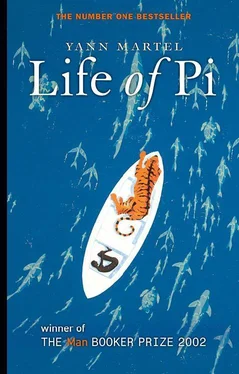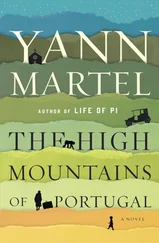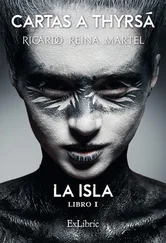Yann Martel - Life of Pi
Здесь есть возможность читать онлайн «Yann Martel - Life of Pi» весь текст электронной книги совершенно бесплатно (целиком полную версию без сокращений). В некоторых случаях можно слушать аудио, скачать через торрент в формате fb2 и присутствует краткое содержание. Год выпуска: 2002, ISBN: 2002, Издательство: Canongate Books, Жанр: Современная проза, на английском языке. Описание произведения, (предисловие) а так же отзывы посетителей доступны на портале библиотеки ЛибКат.
- Название:Life of Pi
- Автор:
- Издательство:Canongate Books
- Жанр:
- Год:2002
- ISBN:9781847674210
- Рейтинг книги:3 / 5. Голосов: 1
-
Избранное:Добавить в избранное
- Отзывы:
-
Ваша оценка:
- 60
- 1
- 2
- 3
- 4
- 5
Life of Pi: краткое содержание, описание и аннотация
Предлагаем к чтению аннотацию, описание, краткое содержание или предисловие (зависит от того, что написал сам автор книги «Life of Pi»). Если вы не нашли необходимую информацию о книге — напишите в комментариях, мы постараемся отыскать её.
Life of Pi — читать онлайн бесплатно полную книгу (весь текст) целиком
Ниже представлен текст книги, разбитый по страницам. Система сохранения места последней прочитанной страницы, позволяет с удобством читать онлайн бесплатно книгу «Life of Pi», без необходимости каждый раз заново искать на чём Вы остановились. Поставьте закладку, и сможете в любой момент перейти на страницу, на которой закончили чтение.
Интервал:
Закладка:
CHAPTER 2
He lives in Scarborough. He’s a small, slim man—no more than five foot five. Dark hair, dark eyes. Hair greying at the temples. Can’t be older than forty. Pleasing coffee-coloured complexion. Mild fall weather, yet puts on a big winter parka with fur-lined hood for the walk to the diner. Expressive face. Speaks quickly, hands flitting about. No small talk. He launches forth .
CHAPTER 3
I was named after a swimming pool. Quite peculiar considering my parents never took to water. One of my father’s earliest business contacts was Francis Adirubasamy. He became a good friend of the family. I called him Mamaji, mama being the Tamil word for uncle and ji being a suffix used in India to indicate respect and affection. When he was a young man, long before I was born, Mamaji was a champion competitive swimmer, the champion of all South India. He looked the part his whole life. My brother Ravi once told me that when Mamaji was born he didn’t want to give up on breathing water and so the doctor, to save his life, had to take him by the feet and swing him above his head round and round.
“It did the trick!” said Ravi, wildly spinning his hand above his head. “He coughed out water and started breathing air, but it forced all his flesh and blood to his upper body. That’s why his chest is so thick and his legs are so skinny.”
I believed him. (Ravi was a merciless teaser. The first time he called Mamaji “Mr. Fish” to my face I left a banana peel in his bed.) Even in his sixties, when he was a little stooped and a lifetime of counter-obstetric gravity had begun to nudge his flesh downwards, Mamaji swam thirty lengths every morning at the pool of the Aurobindo Ashram.
He tried to teach my parents to swim, but he never got them to go beyond wading up to their knees at the beach and making ludicrous round motions with their arms, which, if they were practising the breaststroke, made them look as if they were walking through a jungle, spreading the tall grass ahead of them, or, if it was the front crawl, as if they were running down a hill and flailing their arms so as not to fall. Ravi was just as unenthusiastic.
Mamaji had to wait until I came into the picture to find a willing disciple. The day I came of swimming age, which, to Mother’s distress, Mamaji claimed was seven, he brought me down to the beach, spread his arms seaward and said, “This is my gift to you.”
“And then he nearly drowned you,” claimed Mother.
I remained faithful to my aquatic guru. Under his watchful eye I lay on the beach and fluttered my legs and scratched away at the sand with my hands, turning my head at every stroke to breathe. I must have looked like a child throwing a peculiar, slow-motion tantrum. In the water, as he held me at the surface, I tried my best to swim. It was much more difficult than on land. But Mamaji was patient and encouraging.
When he felt that I had progressed sufficiently, we turned our backs on the laughing and the shouting, the running and the splashing, the blue-green waves and the bubbly surf, and headed for the proper rectangularity and the formal flatness (and the paying admission) of the ashram swimming pool.
I went there with him three times a week throughout my childhood, a Monday, Wednesday, Friday early morning ritual with the clockwork regularity of a good front-crawl stroke. I have vivid memories of this dignified old man stripping down to nakedness next to me, his body slowly emerging as he neatly disposed of each item of clothing, decency being salvaged at the very end by a slight turning away and a magnificent pair of imported athletic bathing trunks. He stood straight and he was ready. It had an epic simplicity. Swimming instruction, which in time became swimming practice, was gruelling, but there was the deep pleasure of doing a stroke with increasing ease and speed, over and over, till hypnosis practically, the water turning from molten lead to liquid light.
It was on my own, a guilty pleasure, that I returned to the sea, beckoned by the mighty waves that crashed down and reached for me in humble tidal ripples, gentle lassos that caught their willing Indian boy.
My gift to Mamaji one birthday, I must have been thirteen or so, was two full lengths of credible butterfly. I finished so spent I could hardly wave to him.
Beyond the activity of swimming, there was the talk of it. It was the talk that Father loved. The more vigorously he resisted actually swimming, the more he fancied it. Swim lore was his vacation talk from the workaday talk of running a zoo. Water without a hippopotamus was so much more manageable than water with one.
Mamaji studied in Paris for two years, thanks to the colonial administration. He had the time of his life. This was in the early 1930s, when the French were still trying to make Pondicherry as Gallic as the British were trying to make the rest of India Britannic. I don’t recall exactly what Mamaji studied. Something commercial, I suppose. He was a great storyteller, but forget about his studies or the Eiffel Tower or the Louvre or the cafés of the Champs-Elysées. All his stories had to do with swimming pools and swimming competitions. For example, there was the Piscine Deligny, the city’s oldest pool, dating back to 1796, an open-air barge moored to the Quai d’Orsay and the venue for the swimming events of the 1900 Olympics. But none of the times were recognized by the International Swimming Federation because the pool was six metres too long. The water in the pool came straight from the Seine, unfiltered and unheated. “It was cold and dirty,” said Mamaji. “The water, having crossed all of Paris, came in foul enough. Then people at the pool made it utterly disgusting.” In conspiratorial whispers, with shocking details to back up his claim, he assured us that the French had very low standards of personal hygiene. “Deligny was bad enough. Bain Royal, another latrine on the Seine, was worse. At least at Deligny they scooped out the dead fish.” Nevertheless, an Olympic pool is an Olympic pool, touched by immortal glory. Though it was a cesspool, Mamaji spoke of Deligny with a fond smile.
One was better off at the Piscines Château-Landon, Rouvet or du boulevard de la Gare. They were indoor pools with roofs, on land and open year-round. Their water was supplied by the condensation from steam engines from nearby factories and so was cleaner and warmer. But these pools were still a bit dingy and tended to be crowded. “There was so much gob and spit floating in the water, I thought I was swimming through jellyfish,” chuckled Mamaji.
The Piscines Hébert, Ledru-Rollin and Butte-aux-Cailles were bright, modern, spacious pools fed by artesian wells. They set the standard for excellence in municipal swimming pools. There was the Piscine des Tourelles, of course, the city’s other great Olympic pool, inaugurated during the second Paris games, of 1924. And there were still others, many of them.
But no swimming pool in Mamaji’s eyes matched the glory of the Piscine Molitor. It was the crowning aquatic glory of Paris, indeed, of the entire civilized world.
“It was a pool the gods would have delighted to swim in. Molitor had the best competitive swimming club in Paris. There were two pools, an indoor and an outdoor. Both were as big as small oceans. The indoor pool always had two lanes reserved for swimmers who wanted to do lengths. The water was so clean and clear you could have used it to make your morning coffee. Wooden changing cabins, blue and white, surrounded the pool on two floors. You could look down and see everyone and everything. The porters who marked your cabin door with chalk to show that it was occupied were limping old men, friendly in an ill-tempered way. No amount of shouting and tomfoolery ever ruffled them. The showers gushed hot, soothing water. There was a steam room and an exercise room. The outside pool became a skating rink in winter. There was a bar, a cafeteria, a large sunning deck, even two small beaches with real sand. Every bit of tile, brass and wood gleamed. It was—it was …”
Читать дальшеИнтервал:
Закладка:
Похожие книги на «Life of Pi»
Представляем Вашему вниманию похожие книги на «Life of Pi» списком для выбора. Мы отобрали схожую по названию и смыслу литературу в надежде предоставить читателям больше вариантов отыскать новые, интересные, ещё непрочитанные произведения.
Обсуждение, отзывы о книге «Life of Pi» и просто собственные мнения читателей. Оставьте ваши комментарии, напишите, что Вы думаете о произведении, его смысле или главных героях. Укажите что конкретно понравилось, а что нет, и почему Вы так считаете.












